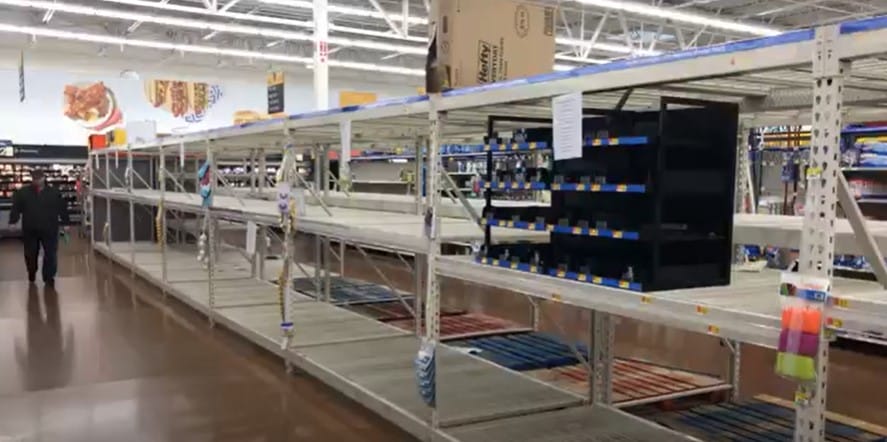 Many of our feelings of anxiousness are exacerbated by social learning. We witness other people panic buying and conclude that there must be a tragedy on the horizon. That’s not always the case, though that panic buying may create a disaster all of its own. Consider the great toilet paper shortage of the early days of COVID-19. Panic buying activities were influenced more by witnessing others stockpiling than proximity to any real danger. After all, gastrointestinal distress or a shortage of wood pulp are not listed symptoms of COVID. Still, we see the herd of people snapping up the inventory of a product, and we reflect on our supply and wonder if we shouldn’t just grab a little extra toilet paper, food, hand sanitizer, cleaning products or whatever else while we can. The panic buying leads to empty shelves, supply shortages, and the feeling that the problem is more significant than it actually is.
We function as a herd, but we don’t have to live in a herd mentality. We read many comments from prepared people who explained what brought them to prepping and how they managed through a disaster. They often begin with “While everybody was panicking, I was doing this” or “I had already stocked this, so I wasn’t worried.” When we see everyone running away from something, you bet we are in a herd mentality. We have joined the stampede even before knowing what we are running from. We instinctively do this because it’s a survival behavior. Prepping allows us to go beyond much of this herd thinking. If we know that the storm is coming from the gathering clouds, it is wise to apply our wisdom of what happens with gathering clouds and get ourselves to higher ground. When we look at the world and are stricken with anxiety because we see so many unaware of the same threats we perceive, it is wise to shed our herd mentality and tend to our own preps and security. Run with the herd when you have to, and understand why the herd is running, but don’t let the anxiety of the herd change your course.
IT’S NOT THE END OF THE WORLD
Many of our feelings of anxiousness are exacerbated by social learning. We witness other people panic buying and conclude that there must be a tragedy on the horizon. That’s not always the case, though that panic buying may create a disaster all of its own. Consider the great toilet paper shortage of the early days of COVID-19. Panic buying activities were influenced more by witnessing others stockpiling than proximity to any real danger. After all, gastrointestinal distress or a shortage of wood pulp are not listed symptoms of COVID. Still, we see the herd of people snapping up the inventory of a product, and we reflect on our supply and wonder if we shouldn’t just grab a little extra toilet paper, food, hand sanitizer, cleaning products or whatever else while we can. The panic buying leads to empty shelves, supply shortages, and the feeling that the problem is more significant than it actually is.
We function as a herd, but we don’t have to live in a herd mentality. We read many comments from prepared people who explained what brought them to prepping and how they managed through a disaster. They often begin with “While everybody was panicking, I was doing this” or “I had already stocked this, so I wasn’t worried.” When we see everyone running away from something, you bet we are in a herd mentality. We have joined the stampede even before knowing what we are running from. We instinctively do this because it’s a survival behavior. Prepping allows us to go beyond much of this herd thinking. If we know that the storm is coming from the gathering clouds, it is wise to apply our wisdom of what happens with gathering clouds and get ourselves to higher ground. When we look at the world and are stricken with anxiety because we see so many unaware of the same threats we perceive, it is wise to shed our herd mentality and tend to our own preps and security. Run with the herd when you have to, and understand why the herd is running, but don’t let the anxiety of the herd change your course.
IT’S NOT THE END OF THE WORLD
 You cannot prepare for the end of the world. When the apocalypse occurs or some other great global cataclysm, it probably won’t matter what preps you have or the efforts you have taken. If a comet hits the planet and creates an extinction-level event, it will not matter how much beans and Ramen you have stored up in your bug out cave. Extinction level events are so-called because they lead to extinction– the fact or process of a species, family, or other groups of animals or plants becoming extinct. Finished. Done. Zeroed out. Given this fact, don’t prepare for extinction-level events or lay up supplies for Armageddon. Prepping with those as your reasons will fill you with inconsolable anxiety. Sure, these things can happen, but if they do, it likely won’t matter what you have stored up on your shelves.
To reduce anxiety in your prepping, focus on what is most likely to befall you. Scientists have determined that volcanic eruptions around Iceland around the year 536 were sufficient enough to block out the sun for much of Eurasia for over a year. Crops failed. A few years later, pestilence raged in the form of the Justinian Plague, which would later come again and be called the Bubonic Plague. It was arguably one of the worst periods to be alive in recorded history– no sunlight, no crops, a raging unknown pestilence, and your standard wars. If you were a Roman, it was awful. However, if you lived in South America, things were probably just fine for you. Even large-scale global events don’t mean the end of the world. A decade or so later, even for those Romans, things got livable again, even if their government collapsed.
My point here is simple. Don’t spend all your time preparing for some massive collapse or disaster when the disaster most likely to occur is more local to you. If you live in a tornado alley, make sure you have prepared for that eventuality before preparing for outlandish hypotheticals. If you live in the country, you don’t have to prepare for civil unrest as your city relatives might need to prep. Suppose there has been a statewide power outage every decade for the last three decades. In that case, that is probably more important and pressing of a tragedy for you to prepare for than other more grandiose but less probable occurrences.
We especially encourage new preppers to conduct a threat assessment before getting too deep into prepping. Rank the disasters that are most likely to occur, from real natural disasters to losing a job or a sudden death. When you prepare yourself to endure the most logical threat you face, you are also preparing yourself for the unexpected threats that may rise to full-blown disasters. Three months’ worth of stored water, after all, is going to serve you the same whether the catastrophe is a pandemic, wildfire, hurricane, or civil unrest. Three months’ worth of food will keep you from going hungry for three months into a range of different disasters. We go into this in greater depth in my free guide you can download which you can find in the description and comment section below. For now, suffice it to say that though the disaster may seem catastrophic and total, though it may seem to be the absolute end of the world for you, it probably, actually, is not. You can prepare for the worst, but you can’t prepare for the end of the world. So, you shouldn’t let the end of the world as you know it to be the anxiety-filled motivator for your day-by-day prepping.
SLOW DOWN AND REMEMBER TO BREATHE
You cannot prepare for the end of the world. When the apocalypse occurs or some other great global cataclysm, it probably won’t matter what preps you have or the efforts you have taken. If a comet hits the planet and creates an extinction-level event, it will not matter how much beans and Ramen you have stored up in your bug out cave. Extinction level events are so-called because they lead to extinction– the fact or process of a species, family, or other groups of animals or plants becoming extinct. Finished. Done. Zeroed out. Given this fact, don’t prepare for extinction-level events or lay up supplies for Armageddon. Prepping with those as your reasons will fill you with inconsolable anxiety. Sure, these things can happen, but if they do, it likely won’t matter what you have stored up on your shelves.
To reduce anxiety in your prepping, focus on what is most likely to befall you. Scientists have determined that volcanic eruptions around Iceland around the year 536 were sufficient enough to block out the sun for much of Eurasia for over a year. Crops failed. A few years later, pestilence raged in the form of the Justinian Plague, which would later come again and be called the Bubonic Plague. It was arguably one of the worst periods to be alive in recorded history– no sunlight, no crops, a raging unknown pestilence, and your standard wars. If you were a Roman, it was awful. However, if you lived in South America, things were probably just fine for you. Even large-scale global events don’t mean the end of the world. A decade or so later, even for those Romans, things got livable again, even if their government collapsed.
My point here is simple. Don’t spend all your time preparing for some massive collapse or disaster when the disaster most likely to occur is more local to you. If you live in a tornado alley, make sure you have prepared for that eventuality before preparing for outlandish hypotheticals. If you live in the country, you don’t have to prepare for civil unrest as your city relatives might need to prep. Suppose there has been a statewide power outage every decade for the last three decades. In that case, that is probably more important and pressing of a tragedy for you to prepare for than other more grandiose but less probable occurrences.
We especially encourage new preppers to conduct a threat assessment before getting too deep into prepping. Rank the disasters that are most likely to occur, from real natural disasters to losing a job or a sudden death. When you prepare yourself to endure the most logical threat you face, you are also preparing yourself for the unexpected threats that may rise to full-blown disasters. Three months’ worth of stored water, after all, is going to serve you the same whether the catastrophe is a pandemic, wildfire, hurricane, or civil unrest. Three months’ worth of food will keep you from going hungry for three months into a range of different disasters. We go into this in greater depth in my free guide you can download which you can find in the description and comment section below. For now, suffice it to say that though the disaster may seem catastrophic and total, though it may seem to be the absolute end of the world for you, it probably, actually, is not. You can prepare for the worst, but you can’t prepare for the end of the world. So, you shouldn’t let the end of the world as you know it to be the anxiety-filled motivator for your day-by-day prepping.
SLOW DOWN AND REMEMBER TO BREATHE
 It isn’t likely you cut, processed, and stacked all the firewood you need for the harsh winter ahead in just one day. You won’t be harvesting and pickling the cucumbers you just planted today. Still, you know you have to do these things and more, and that can cause anxiety. Sometimes we have trouble falling asleep because we know that we have a hard day’s work coming tomorrow. We have to stop, take a deep breath and remind myself that stressing today is sapping the energy I will need tomorrow to face the challenge. We have to remember that we can only do so much pre-thought and pre-planning into an activity in the future. We have to remind ourselves that we are well-equipped and capable of pivoting where we need to in order to accomplish our goals. At some point, our lack of sleep, if we don’t remind myself of these truths, may impede me as we try to meet the challenge of tomorrow.
While prepping inherently possesses a sense of urgency, it is also important to realize that the way to prepare yourself is to methodically do a little each day to build yourself and your preps. If you don’t have the funds to expend on the preps you urgently feel that you need, then brush up or read up on a skill that you may find helpful further down the line. If you cannot afford a personal water filtration device right now, but you feel you may need to filter water in the wild, read up and study how to make a filtration system from scavenged components. Understand what sand does to the contaminants in water. Understand what role activated charcoal plays in the process and how to make your own. Necessity is the mother of invention, as they say, so focus your anxiety about imbalances in your prepped resources into understanding how to create equities through knowledge, understanding, and skill-building.
Prepping isn’t a race. It’s a marathon. It’s the slow build-up to be ready for the disaster that comes your way. Don’t mistake prepping for the disaster itself. You need to do a little each day in multiple different areas to increase your overall odds of survival and to further your longevity in any aftermath. It’s a marathon for which you must prepare. You should prep your mind with skills and experience. You should prep your body with a healthier and active lifestyle. You should slow down, remember to breathe, and focus on the next task at hand, and not be overwhelmed with the possibilities of an assuredly uncertain future.
TAKE THE TIME TO RESPECT YOUR ACCOMPLISHMENTS
It isn’t likely you cut, processed, and stacked all the firewood you need for the harsh winter ahead in just one day. You won’t be harvesting and pickling the cucumbers you just planted today. Still, you know you have to do these things and more, and that can cause anxiety. Sometimes we have trouble falling asleep because we know that we have a hard day’s work coming tomorrow. We have to stop, take a deep breath and remind myself that stressing today is sapping the energy I will need tomorrow to face the challenge. We have to remember that we can only do so much pre-thought and pre-planning into an activity in the future. We have to remind ourselves that we are well-equipped and capable of pivoting where we need to in order to accomplish our goals. At some point, our lack of sleep, if we don’t remind myself of these truths, may impede me as we try to meet the challenge of tomorrow.
While prepping inherently possesses a sense of urgency, it is also important to realize that the way to prepare yourself is to methodically do a little each day to build yourself and your preps. If you don’t have the funds to expend on the preps you urgently feel that you need, then brush up or read up on a skill that you may find helpful further down the line. If you cannot afford a personal water filtration device right now, but you feel you may need to filter water in the wild, read up and study how to make a filtration system from scavenged components. Understand what sand does to the contaminants in water. Understand what role activated charcoal plays in the process and how to make your own. Necessity is the mother of invention, as they say, so focus your anxiety about imbalances in your prepped resources into understanding how to create equities through knowledge, understanding, and skill-building.
Prepping isn’t a race. It’s a marathon. It’s the slow build-up to be ready for the disaster that comes your way. Don’t mistake prepping for the disaster itself. You need to do a little each day in multiple different areas to increase your overall odds of survival and to further your longevity in any aftermath. It’s a marathon for which you must prepare. You should prep your mind with skills and experience. You should prep your body with a healthier and active lifestyle. You should slow down, remember to breathe, and focus on the next task at hand, and not be overwhelmed with the possibilities of an assuredly uncertain future.
TAKE THE TIME TO RESPECT YOUR ACCOMPLISHMENTS
 You likely came to a prepper mindset because of something you witnessed or bore the brunt of as your younger self. It’s essential to keep that younger, vulnerable self in mind when examining your present and future. If you lived through a horrible natural disaster, for instance, you probably will prepare to not go through such a disaster as ill-equipped as you were the first time. You have built skills, knowledge, physical preps, and ample supplies to carry you through. Imagine if you had what you have now when you were in that catastrophe of the past. You likely would have fared far better than you did then when you were barely surviving.
Use the sunny days of today to reflect upon what you have built to prepare for the future and to illuminate what you still need to prepare. Assuage the anxiety you feel about the uncertain future with the salve of what you have built and continue to build for yourself. What did you learn if you tried to grow a plant this year and failed? It is still an accomplishment that you tried at all. It is still an accomplishment that you even understand what you might have done wrong. It is an accomplishment in that you can apply the lessons learned from that experience to future endeavors. Give your respect to what you have accomplished, and rest more confidently in the knowledge that you can rise to the coming challenges just as you rose to meet the challenges of today. Get up and do rise, though. Commit to doing something toward your goal every day, and don’t rest for too long.
Do you ever say to yourself, “If I knew what I know now back then, I would have done things differently?” Well, guess what? You do know more now. Part of prepping is addressing future concerns. It is giving forethought to future possibilities. It is mindfully addressing anticipated future concerns. To do that, you have to assure yourself and reaffirm that you are on the right path. You have to respect how far you have come. While you still might not make it through whatever the future throws at you, the chances are far greater that you will. Calm your sometimes crippling anxiety by permitting yourself to appreciate how very different you are today because of the work you have put in than you were so many years prior. You are no longer the naive victim of the world around you, but you are better equipped to face the challenges.
PREDICTABLE VERSUS ANTICIPATED
You likely came to a prepper mindset because of something you witnessed or bore the brunt of as your younger self. It’s essential to keep that younger, vulnerable self in mind when examining your present and future. If you lived through a horrible natural disaster, for instance, you probably will prepare to not go through such a disaster as ill-equipped as you were the first time. You have built skills, knowledge, physical preps, and ample supplies to carry you through. Imagine if you had what you have now when you were in that catastrophe of the past. You likely would have fared far better than you did then when you were barely surviving.
Use the sunny days of today to reflect upon what you have built to prepare for the future and to illuminate what you still need to prepare. Assuage the anxiety you feel about the uncertain future with the salve of what you have built and continue to build for yourself. What did you learn if you tried to grow a plant this year and failed? It is still an accomplishment that you tried at all. It is still an accomplishment that you even understand what you might have done wrong. It is an accomplishment in that you can apply the lessons learned from that experience to future endeavors. Give your respect to what you have accomplished, and rest more confidently in the knowledge that you can rise to the coming challenges just as you rose to meet the challenges of today. Get up and do rise, though. Commit to doing something toward your goal every day, and don’t rest for too long.
Do you ever say to yourself, “If I knew what I know now back then, I would have done things differently?” Well, guess what? You do know more now. Part of prepping is addressing future concerns. It is giving forethought to future possibilities. It is mindfully addressing anticipated future concerns. To do that, you have to assure yourself and reaffirm that you are on the right path. You have to respect how far you have come. While you still might not make it through whatever the future throws at you, the chances are far greater that you will. Calm your sometimes crippling anxiety by permitting yourself to appreciate how very different you are today because of the work you have put in than you were so many years prior. You are no longer the naive victim of the world around you, but you are better equipped to face the challenges.
PREDICTABLE VERSUS ANTICIPATED
 You cannot predict the future. You can anticipate specific probable outcomes based on your gathered facts, experience, and understanding of people’s behaviors, but you never can truly predict with absolute certainty any particular future. People will surprise you. Even the weather will surprise you, but prepping takes away some of that surprise. You can still be in shock that a tornado touched down in your area or on your house. Nobody could have predicted that would occur, yet everyone could have anticipated the event with a bit of thought. The area has a history of tornado activity. The area is right along the travel lines of previous tornadoes. The area may be even overdue for a tornado. Maybe, even, the weather patterns have been forming for months and years to create a particularly bad season. You cannot know with certainty that one will drop on you, but you can anticipate increased likelihood. You can prepare for the possibility.
We are not all blessed with the direct line that Noah had of future events. We probably aren’t a world-shaking leader pulling the strings behind the curtain and influencing global affairs. Because of this, we cannot predict the outcomes, but we can anticipate the possibilities and categorize those possibilities based upon their influence and proximity to us. I’m not going to prioritize a hurricane because an earthquake is more likely for me. When we can acknowledge that we cannot predict the future, we can shed the anxiety that is borne of that uncertainty. However, we do not surrender our ability to reason out what we can expect–what we can anticipate in the future.
PHONE A FRIEND
You cannot predict the future. You can anticipate specific probable outcomes based on your gathered facts, experience, and understanding of people’s behaviors, but you never can truly predict with absolute certainty any particular future. People will surprise you. Even the weather will surprise you, but prepping takes away some of that surprise. You can still be in shock that a tornado touched down in your area or on your house. Nobody could have predicted that would occur, yet everyone could have anticipated the event with a bit of thought. The area has a history of tornado activity. The area is right along the travel lines of previous tornadoes. The area may be even overdue for a tornado. Maybe, even, the weather patterns have been forming for months and years to create a particularly bad season. You cannot know with certainty that one will drop on you, but you can anticipate increased likelihood. You can prepare for the possibility.
We are not all blessed with the direct line that Noah had of future events. We probably aren’t a world-shaking leader pulling the strings behind the curtain and influencing global affairs. Because of this, we cannot predict the outcomes, but we can anticipate the possibilities and categorize those possibilities based upon their influence and proximity to us. I’m not going to prioritize a hurricane because an earthquake is more likely for me. When we can acknowledge that we cannot predict the future, we can shed the anxiety that is borne of that uncertainty. However, we do not surrender our ability to reason out what we can expect–what we can anticipate in the future.
PHONE A FRIEND
 If you still feel anxiety about the future after all of that, you can always phone a friend. Reconnect with positive family and friends that you may not have appreciated as much the first time around. Go make new friends around the positive aspects of your prepping journey. What we mean by this is you would be better served to cultivate the positive with new or rekindled relationships than you would be by joining groups that merely confirm your biases. You would get far more from making a friend at a soap-making, wood carving, or basket-weaving class than you would by joining an online apocalypse-prepping group. You will experience far less anxiety in your life if you can point to positive things you did with a group to change the world in small but positive ways. Did you participate in a sock drive for the homeless? Did you clean up a local park or paint over some graffiti? Did you make a new connection at the farmer’s market, at church, or through a mutual interest group at your library or community center?
Some people can calm you and make you feel like you matter, and your contributions are essential to the greater good. Then, some act as an echo chamber, hype us up and send us over the top with stress. Some people thrive on the adrenaline of anger and argument. Some people meticulously plod along, seemingly with blinders on, towards their goal. Be the person who focuses on the purpose and passes on the debate. More and more, less is solved through argument than by actual action. You can act or argue, but you cannot do both successfully. Neither should you do either exclusively. Sometimes you can’t sit on the sidelines and ignore the world.
What you can do is strike a balance that favors surrounding yourself with a positive and supportive community. If you look at your life and you don’t see a good network of positive, helping people that have your back and encourage you, it may be time to clean a little house, cut a few people loose, and make some new connections or phone a friend. Build a community.
CONCLUSION
Some anxiety is good. We do good and fast work when we have a fire lit under us because we can feel the heat of the flames. So, when you are prepping, you are justifiably feeling a little anxious because you are prepping for smoke and flames you can clearly see in your mind’s eye on the horizon. You can’t let that anxiety become so overwhelming, however, that it cripples your forward progress. If the flames are approaching, you still need to figure out how to put them out or survive them passing through. There’s crippling anxiety and productive anxiety, and there is a difference. When you understand that difference, take the time to appreciate what you have accomplished and what you have in place, take the time to breathe, slow down, avoid herd mentality, and prep for what you will reasonably face, you turn crippling anxiety into actionable motivating pressure. You are better, as a result, of this reigning in of anxiety, capable of staying focused and steadily plodding along to the larger goal of self-sufficiency and independence from a system destined to fail.
What do you think? What are you feeling anxious about in the future, and what are you doing to cope with and channel that energy? Let us know in the comments below.
If you still feel anxiety about the future after all of that, you can always phone a friend. Reconnect with positive family and friends that you may not have appreciated as much the first time around. Go make new friends around the positive aspects of your prepping journey. What we mean by this is you would be better served to cultivate the positive with new or rekindled relationships than you would be by joining groups that merely confirm your biases. You would get far more from making a friend at a soap-making, wood carving, or basket-weaving class than you would by joining an online apocalypse-prepping group. You will experience far less anxiety in your life if you can point to positive things you did with a group to change the world in small but positive ways. Did you participate in a sock drive for the homeless? Did you clean up a local park or paint over some graffiti? Did you make a new connection at the farmer’s market, at church, or through a mutual interest group at your library or community center?
Some people can calm you and make you feel like you matter, and your contributions are essential to the greater good. Then, some act as an echo chamber, hype us up and send us over the top with stress. Some people thrive on the adrenaline of anger and argument. Some people meticulously plod along, seemingly with blinders on, towards their goal. Be the person who focuses on the purpose and passes on the debate. More and more, less is solved through argument than by actual action. You can act or argue, but you cannot do both successfully. Neither should you do either exclusively. Sometimes you can’t sit on the sidelines and ignore the world.
What you can do is strike a balance that favors surrounding yourself with a positive and supportive community. If you look at your life and you don’t see a good network of positive, helping people that have your back and encourage you, it may be time to clean a little house, cut a few people loose, and make some new connections or phone a friend. Build a community.
CONCLUSION
Some anxiety is good. We do good and fast work when we have a fire lit under us because we can feel the heat of the flames. So, when you are prepping, you are justifiably feeling a little anxious because you are prepping for smoke and flames you can clearly see in your mind’s eye on the horizon. You can’t let that anxiety become so overwhelming, however, that it cripples your forward progress. If the flames are approaching, you still need to figure out how to put them out or survive them passing through. There’s crippling anxiety and productive anxiety, and there is a difference. When you understand that difference, take the time to appreciate what you have accomplished and what you have in place, take the time to breathe, slow down, avoid herd mentality, and prep for what you will reasonably face, you turn crippling anxiety into actionable motivating pressure. You are better, as a result, of this reigning in of anxiety, capable of staying focused and steadily plodding along to the larger goal of self-sufficiency and independence from a system destined to fail.
What do you think? What are you feeling anxious about in the future, and what are you doing to cope with and channel that energy? Let us know in the comments below. 
